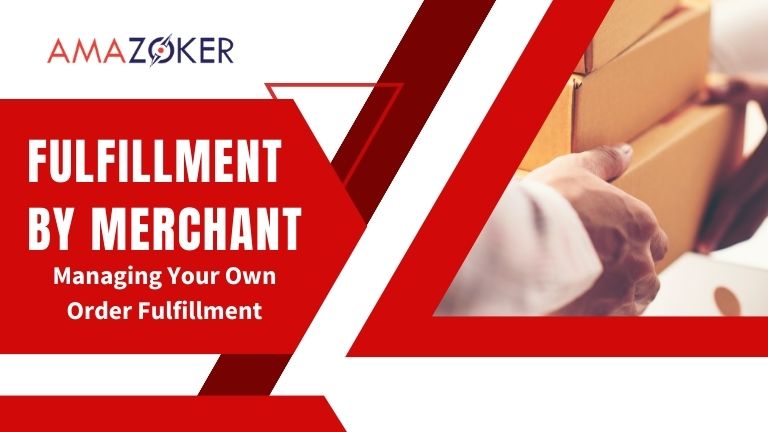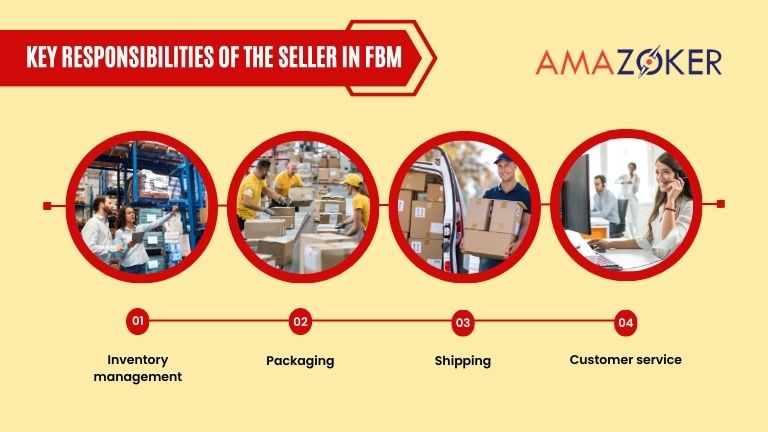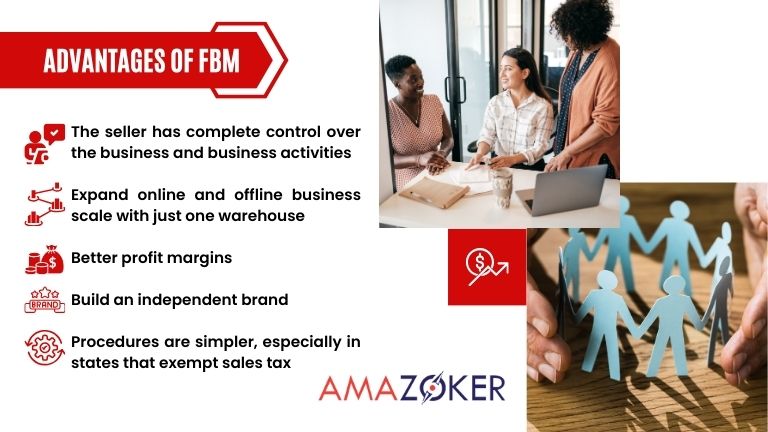FULFILLMENT BY MERCHANT: MANAGING YOUR OWN ORDER FULFILLMENT

Source: https://amazoker.com/fulfillment-by-merchant/
In the ever-evolving landscape of e-commerce, businesses are constantly seeking efficient and cost-effective ways to manage their operations. One such method that has gained significant traction in recent years is Fulfillment by Merchant. In this blog post, we will delve into the intricacies of Fulfillment by MerchantWhat is Fulfillment by Merchant?
Fulfillment by Merchant, often abbreviated as FBM, refers to a method of order fulfillment in which the seller is responsible for storing, packing, and shipping their products directly to customers.
Unlike Fulfillment by Amazon (FBA), where Amazon handles the entire fulfillment process, FBM places the onus of logistics squarely on the merchant. This means that the seller is in control of the entire fulfillment process and is responsible for ensuring that orders are processed and delivered to customers in a timely manner.
Key responsibilities of the seller in FBM include:
- Inventory management: The seller is responsible for keeping track of their inventory levels and ensuring that they have enough stock to fulfill customer orders.
- Packaging: The seller must package their products securely and in a professional manner to ensure that they arrive at the customer’s doorstep in good condition.
- Shipping: The seller is responsible for choosing a reliable shipping carrier and ensuring that orders are shipped out promptly.
- Customer service: The seller is also responsible for handling any customer inquiries or issues related to the fulfillment of their orders.

The primary duties of the seller in Fulfillment by Merchant
In the dynamic landscape of e-commerce, Fulfillment by Merchant stands as a testament to the diverse array of options available to businesses, each with its own set of opportunities and challenges. As the industry continues to evolve, the role of FBM in shaping the future of retail fulfillment remains a topic of great interest and significance.
Who is Fulfillment by Merchant suitable for?
Fulfillment by Merchant is suitable for a variety of sellers, particularly those who have the capacity and resources to handle their own order fulfillment. It may be a good fit for:
- Small businesses and startups: FBM allows small businesses to maintain control over their fulfillment process without the need for large-scale infrastructure or resources.
- Custom or personalized products: Sellers offering custom or personalized products may prefer FBM as it allows them to have more control over the packaging and shipping of their unique items.
- Local or niche market sellers: FBM can be beneficial for sellers targeting a specific geographic area or niche market, as they can handle their own shipping and delivery to their target audience.
- Control over branding and customer experience: FBM allows sellers to maintain full control over the branding and customer experience throughout the fulfillment process, which may be important for some businesses.
Advantages of Fulfillment by Merchant
The decision to opt for Fulfillment by Merchant comes with a myriad of advantages, each contributing to the appeal of this fulfillment method.

There are numerous benefits associated with choosing Fulfillment by Merchant as your preferred option
The seller has complete control over the business and business activities
One of the primary advantages of Fulfillment by Merchant is the autonomy it affords to sellers. By managing their own fulfillment, merchants have the freedom to make decisions regarding inventory, packaging, and shipping methods. This level of control can be invaluable in maintaining brand consistency and ensuring that customer expectations are consistently met.
Expand online and offline business scale with just one warehouse
By consolidating fulfillment operations under one roof, merchants can streamline their logistical processes and scale their business more efficiently. With a centralized warehouse, it becomes easier to manage inventory levels, reduce shipping costs, and optimize order processing. This not only benefits online sales but also facilitates the expansion of offline retail operations, providing a cohesive approach to omnichannel retailing.
Better profit margins
FBM can contribute to improved profit margins for sellers, particularly when compared to the fees associated with third-party fulfillment services. By eliminating the costs of outsourcing fulfillment, businesses can allocate resources more effectively and potentially increase their bottom line.
Build an independent brand
For many merchants, brand identity is a cornerstone of their business strategy. Fulfillment by Merchant allows sellers to maintain a distinct brand image throughout the fulfillment process, from customized packaging to personalized thank-you notes. This level of brand control can foster stronger customer loyalty and differentiate the business in a crowded marketplace.
Procedures are simpler, especially in states that exempt sales tax
In certain jurisdictions, FBM can offer a simplified approach to sales tax compliance. States that exempt sales tax on goods stored in their jurisdiction may present an opportunity for FBM sellers to navigate tax regulations with greater ease, potentially reducing administrative burdens and associated costs.
Limitations
While Fulfillment by Merchant offers numerous advantages, it is essential to acknowledge its limitations and potential challenges.

It is crucial to recognize the limitations of Fulfillment by Merchant
Greater logistical responsibility
With FBM, merchants bear the full responsibility of managing their fulfillment operations, from inventory accuracy to timely shipping. This can be a significant undertaking, particularly for businesses with limited resources or experience in logistics management. Without the support of a dedicated fulfillment partner, sellers must ensure that they have the infrastructure and expertise to fulfill orders efficiently and accurately.
Limited scalability
For rapidly growing businesses, the scalability of Fulfillment by Merchant may present challenges. As order volumes increase, maintaining adequate inventory levels and fulfilling orders in a timely manner can strain internal resources. Without the infrastructure and flexibility of a larger fulfillment network, businesses may encounter limitations in their ability to scale operations seamlessly.
Variable shipping costs
Shipping costs can fluctuate based on factors such as package size, weight, and destination. With FBM, sellers must navigate these variables independently, potentially leading to variations in shipping expenses. This can impact the predictability of fulfillment costs and necessitate ongoing adjustments to pricing strategies to accommodate fluctuating shipping expenses.
In conclusion, Fulfillment by Merchant offers a compelling alternative for businesses seeking greater control over their fulfillment operations. From autonomy and brand customization to potential cost savings, the advantages of FBM are evident. However, it is crucial for merchants to carefully consider the logistical demands and potential limitations associated with this fulfillment method. With the right approach, Fulfillment by Merchant can be a valuable tool for businesses looking to grow and thrive in the competitive world of e-commerce.
Comments
Post a Comment